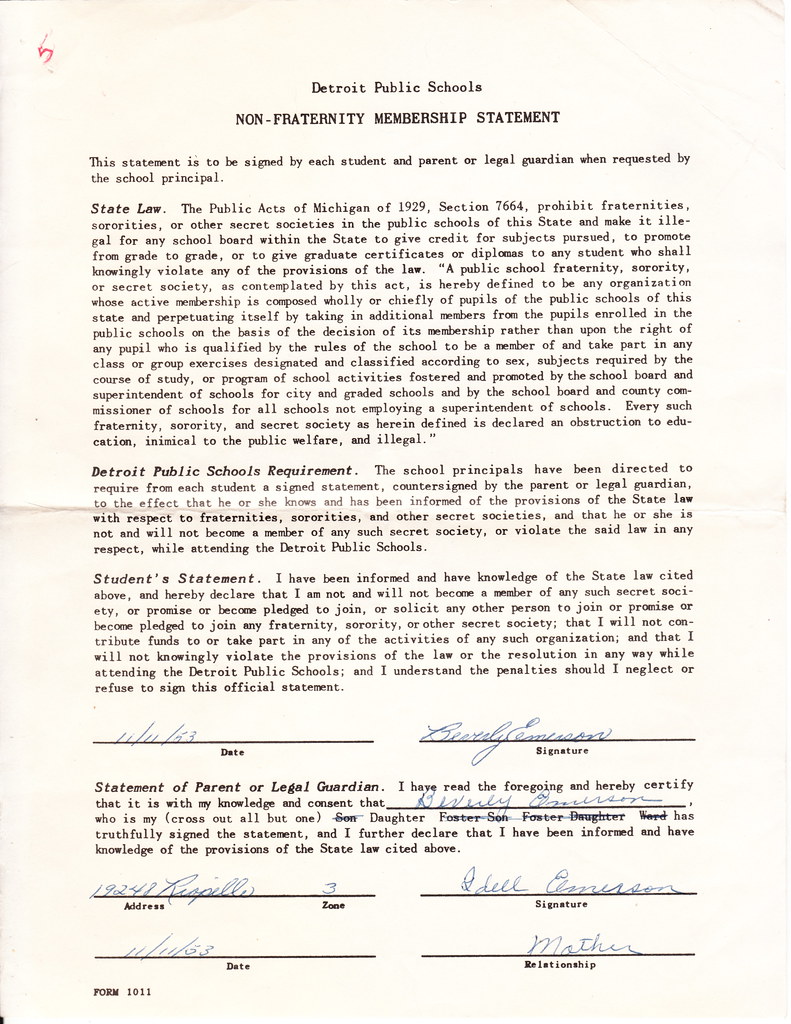
I didn't set out to become a report card collector, specializing in student records from old vocational schools, but that's what's happened. In addition to the 395 Depression-era files from the Manhattan Trade School for Girls, I also stumbled across a small stash of 1950s report cards from Cass Tech, a vocational school in Detroit. (I'll explain how I found the Cass Tech files -- and will give further info on how I found the Manhattan Trade cards -- in the Slate series next month.)
By and large, the Cass Tech files aren't as interesting as the ones from Manhattan Trade -- with one exception. Each Cass Tech student record includes a "Non-Fraternity Membership Statement" like the one shown above (here's a larger view, so you can read it). It cites a 1929 state law that prohibits
any organization [in the public schools] whose active membership is composed wholly of chiefly of pupils in the public schools of this state and perpetuating itself by taking in additional members from the pupils in the public schools on the basis of the decision of its membership rather than upon the right of any pupil who is qualified by the rules of the school to be a member of and take part in any class or group exercises…
In short: Don't join a private club that excludes other kids. But if such groups were already banned, why was it necessary to make the students -- and their parents! -- sign a promise not to join them? And why was the ban enacted in the first place? Was it just to ensure that all kids would have equal access to school activities, or was there something larger at work? (If the law had been enacted in, say, 1952, it would be easy to view it as an outgrowth of McCarthyism. But it was enacted back in 1929, which doesn't seem like a particularly anti-secret society period.)
I've spoken to one Cass Tech student from this period (not the one whose signed form is shown at the top of this entry), and he had no memory of any of this. I've also tried Googling the statute in question -- the Public Acts of Michigan of 1929, Section 7664 -- to see if I could glean any legislative history, but I came up empty.
If anyone from Michigan knows more about this, I'm all ears.

What I find interesting is both names appeared to have been signed by the same person. So either Idell signed for Beverly or vice versa. Looking at the document in full size you can see the 5's in the date are identical and the E's in Emerson.
ReplyDeleteI had heard that in the sixties there were fraternities in the high schools which were the same as college. I assume when you left high school and went to college your membership carried over.
My mom graduated from a DPS high school in 62. I'll ask her and see if she recalls the form or fraternities.
Interesting piece. I haven't been able to find the statute, suggesting that it's been repealed, or that there's an error in the citation. Each year's public act has its own number, with sections therein, which are then turned into different statue numbers. Nothing makes sense to me for 7440: it doesn't match the MCL sections, and it's a huge number for either a Public Act, or a section in a single act.
ReplyDeleteIronically, Michigan actually has a great governmental website, it just doesn't have searchable 1929 public acts. Link: http://lexs.it/pQTqKv
BTW, Cass Tech, despite the name, is definitely not a vocational school, but college prep. The city's best and brightest went/go there, from every neighborhood. Here's some info: http://en.wikipedia.org/wiki/Cass_Technical_High_School
Really? I had been told that it was a vocational school, and its name certainly implies that. (Yes, I realize you said, "Despite the name...")
ReplyDeleteCass Tech was a little bit "vocational" in that it had a certain trade school component to it, but it really was a destination magnet-esque school for the brightest students from around Detroit. There were a number of other vocational schools for more specific things, but Cass Tech has always had the reputation of bringing in the best students, with a certain amount of exclusivity and prestige. My grandfather was a Cass Tech grad after he came to America in the late 20s. He went to night school there to learn how to be an Electrician. In the 1960s, my mom tested for and was offered a slot there, but declined it.
ReplyDeleteCass Tech still exists, though it moved from its original building to a newer, uglier building (albeit with less rats and asbestos) nearby. Old Cass Tech stood empty, was scrapped, and as we speak, is almost completely torn down. Demolition should be finished within the month, I guess.
If you want to know more about Cass Tech, and actually get in touch with people who were at the school at the time, I would recommend posting a thread at DetroitYes.com, which is just about the best resource anywhere for finding firsthand information about anything in Detroit. Lots of current residents and long-time expats on there who will know where to direct you. I wouldn't be surprised in the least if you were able to find someone who signed one of your documents.